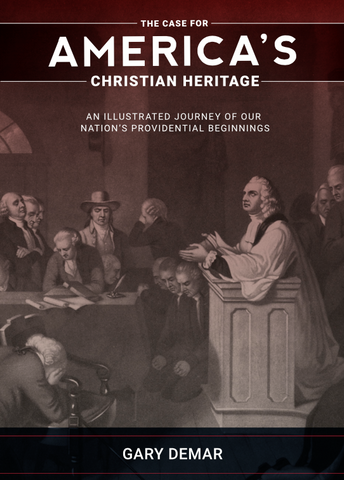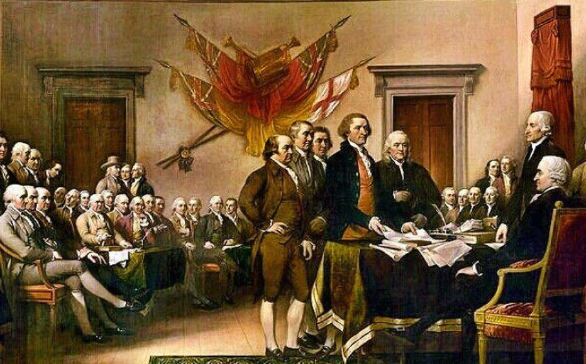A misconception is held by many that the drafting and signing of the Declaration of Independence was the beginning of our nation. Abraham Lincoln’s “Gettysburg Address” (Nov. 19, 1863) contributes to the confusion with the opening line: “Four score and seven years ago our fathers brought forth on this continent, a new nation, conceived in Liberty, and dedicated to the proposition that all men are created equal.”
While America was not a nation of united states at the time, she was a nation nonetheless. Thirteen colonies with independent governments and intact constitutions were operating in 1776. The 52 signers of the Declaration weren’t dropped from the sky in Philadelphia on July 2. The freshly printed document announced that the 13 American colonies, then at war with Great Britain, were now independent states and no longer part of the British Empire. The decision was not made lightly. Thomas Jefferson expressed the sentiments of most of his fellow Americans in a letter he had written in November of 1775 to John Randolph, who was in England at the time:
Believe me, dear Sir: there is not in the British empire a man who more cordially loves a union with Great Britain than I do. But, by the God that made me, I will cease to exist before I yield to a connection on such terms as the British Parliament propose[s]; and in this, I think I speak the sentiments of America.
In Jefferson’s mind, there was an America before its written Declaration of Independence. The political ideals of those who forged a more unified nation were not developed within a worldview vacuum. Since ideas have consequences, we should expect that the beliefs of the existing colonies would have an impact on the newly formed national government, and if not, then the individual states would retain them as they did. Sadly, however, the truth about our once robust Christian heritage is being steadily dismantled. The early colonies’ reliance on God’s providence is nothing more than a faded memory for most Americans. If we are ever to restore what is about to be lost, we will need to learn the truth about our nation’s founding.

The Case for America's Christian History
America’s original founding was rooted deeply in the things of Jesus Christ and His kingdom. The original charter given to Sir Walter Raleigh by Queen Elizabeth I in the 16th century was to establish “the true Christian faith.” John Rolfe at Jamestown sought to “advance the Honor of God and to propagate his Gospel.” The faithful Christians who wrote the Mayflower Compact stated that their mission was “for the Glory of God and advancements of the Christian faith.”
Buy NowWith this in mind, it is good to be reminded of what the Declaration of Independence actually says. July 4th is a day off work for most people and a great time to spend with friends and family. But it is also a day to remember the historical significance and what it means for today and tomorrow. Read the beginning and end of the Declaration below and ask yourself if these words from nearly 250 years are still applicable today (hint: they are).
WHEN in the Course of human Events, it becomes necessary for one People to dissolve the Political Bands which have connected them with another, and to assume among the Powers of the Earth, the separate and equal Station to which the Laws of Nature and of Nature’s God entitle them, a decent Respect to the Opinions of Mankind requires that they should declare the causes which impel them to the Separation.
We hold these Truths to be self-evident, that all Men are created equal, that they are endowed by their Creator with certain unalienable Rights, that among these are Life, Liberty, and the Pursuit of Happiness—-That to secure these Rights, Governments are instituted among Men, deriving their just Powers from the Consent of the Governed, that whenever any Form of Government becomes destructive of these Ends, it is the Right of the People to alter or to abolish it, and to institute new Government, laying its Foundation on such Principles, and organizing its Powers in such Form, as to them shall seem most likely to effect their Safety and Happiness. Prudence, indeed, will dictate that Governments long established should not be changed for light and transient Causes; and accordingly all Experience hath shewn, that Mankind are more disposed to suffer, while Evils are sufferable, than to right themselves by abolishing the Forms to which they are accustomed. But when a long Train of Abuses and Usurpations, pursuing invariably the same Object, evinces a Design to reduce them under absolute Despotism, it is their Right, it is their Duty, to throw off such Government, and to provide new Guards for their future Security. Such has been the patient Sufferance of these Colonies; and such is now the Necessity which constrains them to alter their former Systems of Government. The History of the present King of Great-Britain is a History of repeated Injuries and Usurpations, all having in direct Object the Establishment of an absolute Tyranny over these States. To prove this, let Facts be submitted to a candid World…
We, therefore, the Representatives of the UNITED STATES OF AMERICA, in General Congress, Assembled, appealing to the Supreme Judge of the World for the Rectitude of our Intentions, do, in the Name, and by Authority of the good People of these Colonies, solemnly Publish and Declare, That these United Colonies are, and of Right ought to be, Free and Independent States; that they are absolved from all Allegiance to the British Crown, and that all political Connection between them and the State of Great-Britain, is and ought to be totally dissolved; and that as Free and Independent States, they have full Power to levy War, conclude Peace, contract Alliances, establish Commerce, and to do all other Acts and Things which Independent States may of right do. And for the support of this Declaration, with a firm Reliance on the Protection of divine Providence, we mutually pledge to each other our Lives, our Fortunes, and our sacred Honor.

